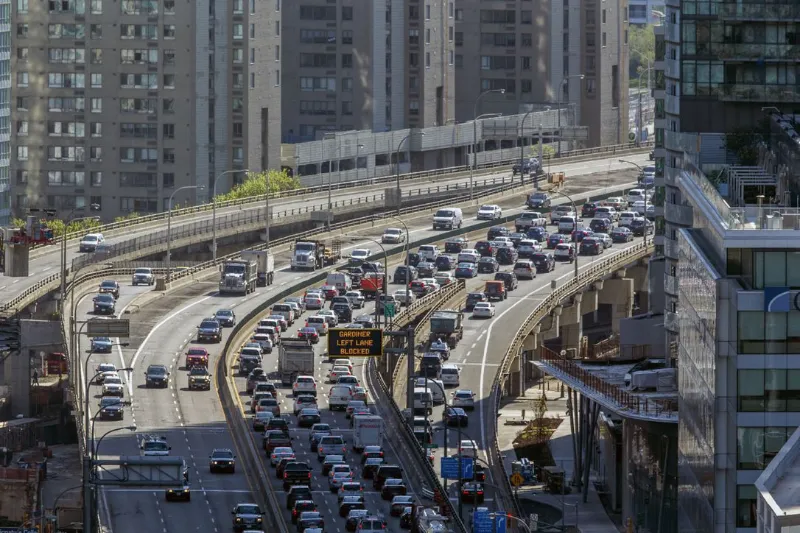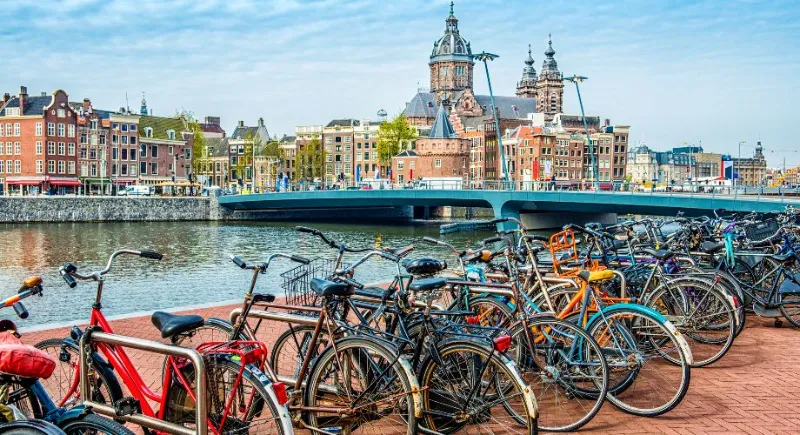Among those of us batting for bicycle transport, many hold a quaint misconception that travel mode choices are made voluntarily. They suppose that the whole city will swap cars for bikes when they have their awakenings. Those holding onto such hopes make the inductive fallacy that because they personally choose to ride bikes, everyone else will choose to ride bikes when they see cycling is quicker, healthier, greener, etc. If they could only stand back and take a whole population view, they would see a city’s mode share as not a matter of cultural practice. Mode shares are built.
Rotterdam illustrates this clearly, where 56% of all trips are by car, compared to 28% in Amsterdam. Both cities have the same culture, “strict liability” laws to slow drivers, the same pancake flatness, the same kind of tram network, and bike infrastructure. The difference is Rotterdam has motorways discharging traffic directly into the city’s heart, where dozens of multi-story car parking stations exist.
The motorways and parking in Rotterdam are what make this a city with double the driving. Relative to cycling, driving rates in Rotterdam may appear to be falling, but that is only because cycling has excess capacity. The actual number of car trips in a city only ever increases once the mode has been built with concrete and steel.

Aldo Rossi’s term “fact” seems apt in describing motorways and car parking stations in a car city. These structures are facts in the way historical monuments in a city are facts. If destroyed, they will be rebuilt in some guise, or at the very least, they will live within cities’ memories.
The notion we hear from many bike advocates that one day all these monumental facts will be discarded or repurposed relies on Right beating Might at the ballot box and cars being taxed from the existence of an energy crisis. Unfortunately, Right is yet to beat Might since the Greeks devised democracy. As for any fossil fuel supply hiccup, it will more likely usher in a nuclear age than one that is powered by pedals.
Neither does a recent doubling of bike trips worldwide make it inextricable that car trips are now set to plummet. In fact, these car cities we have built (among which Rotterdam is quite a tame one), could yet see their capacity for car trips increasing. If driverless cars had their day, we could see existing car infrastructure handling ten times the number of car trips. Braking distances and cautionary gaps at intersections would be filled with computer-driven cars programmed to miss each other by inches. Most would be driverless taxis.

The motorways and car parking stations condemning our cities to car-centric futures are already there. They are built. They are facts. As a civilization, we have been spending our surpluses building these things, like the Egyptians building their pyramids. Humankind’s busiest 7 decades of urbanization have coincided with: motorways aimed squarely at city centers; multi-story car parking stations in cities; internal garaging in homes; the disappearance of cloakrooms because cars keep us dry; and the emergence of specialized jobs, schools, and hobbies that have us driving all over our cities instead of staying put in one neighborhood. Cars are like bytes, cities like hardware, and our organizational structures are software.
Conservatives needn’t worry about bikes screwing up the hardware and software of car-focused cities, just as they needn’t worry about the common cold virus infecting their hard drives. In cities organized around driving, bikes are not bona fide bytes. So long as car infrastructure exists and cycling is forced onto the crumbling edges of the street network, its modal share will max out somewhere between 5 and 10%, like Portland’s in Oregon.
Add Rotterdam’s unsurpassed bike infrastructure, and you might reach that city’s bike modal share of 14%. The city will not be bike-dependent. Families will not be car-free. Specialized schools will keep drawing kids from the whole region. Little-league sports would still have away games. Your employer could still move to new premises on the outskirts of town. Choosing bikes will still call on your reserves of tenacity, like choosing to eat healthy in a world of fast food.

We might assume someone aiming to maximize their wealth and their health by going car-free and depending on bikes instead would be better off living in Amsterdam than in Rotterdam. Employers and little league sports bodies there would surely be a little more mindful; after all, there are more trips by bike (38%) than driving (28%) or transit (30%). But if we look at the cycling experience, in some ways, it is better in Rotterdam.
Rotterdam has more bike parking in homes, thanks to most of its housing being built post-1950 when Dutch building codes mandated bike rooms. Better security means using better bikes because they are less likely to be stolen. The cycle tracks are generally smoother and certainly less congested, and you can park your bike closer to the train station.
Thinking this way, you begin to realize that all those extra bike trips in Amsterdam are not because the cycling is better, but because the driving is worse. The only lesson we can borrow from Amsterdam and take to the world is that we need to demolish the freeways that run through our cities and demolish our car parking stations. In our car-loving democracies, that cannot happen.
If we are lucky, the best minds in bicycle planning have car cities on a trajectory toward Rotterdam’s level of bike use. But in the context of global warming and rising obesity, 14% is not enough. We need to stop hoping against hope that a democratically elected government will ban cars, or electric cars, or tax fuel, or not consider nuclear power if that’s what is needed to keep the cars running. We must think more creatively, even obliquely, about ways to make cycling significant across the population.

If you have followed this blog for a while, you will know that is what I am about. I’m largely drawing ideas from the history of the automobile’s ascension. There are lessons there that we can apply to put cycling on par. Actually, better than par because the bike is an intrinsically rational tool, whereas the car is full of redundancy.
Don’t be surprised if what you just read appears as the first few pages of my next book. I would be delighted to hear your opinions, suggestions, corrections, whatever.

